NOTE: For prior parts in The Archivist series you can view an archive of it all here. And for his older series see: Musings of an Iraqi Brasenostril on Jihad.
—
The Archivist: Unseen Islamic State Military Commanders Manual: Qualities and Manners of the Mujahid Commander
By Aymenn al-Tamimi
In keeping with its statehood image, the Islamic State (IS) seeks to present its fighting forces as akin to an organized military, with a bureaucratic department known as the Diwan al-Jund (Soldiers Department) as part of the system of Diwans to cover various aspects of state governance since the declaration of the Caliphate. To be sure, there is still a considerable degree of obscurity as to the nature of organization of the military. From the documentary evidence, names of various battalions have emerged such as the Yarmouk Battalion, the Furqan Brigade, the al-Qa’qaa’ battalion, the al-Sadiq Special Battalion. From the battalion names that are known, it would appear that they are wilaya [province] or region specific. For instance, the al-Qa’qaa’ battalion seems to be a specific product of the ‘Idad al-Fatiheen institute in the town of al-Bab.
In addition, there are also divisions of units explicitly defined according to capabilities such as sniper attacks and air defence, as well as operatives who may be defined as istishhadiyun [‘martyrdom operatives’- i.e. suicide bombers] and inghimasiyun [commandos]. Shari’i officials may also have a role to play in providing spiritual and moral direction before and after battles as well as during times when there are no battles. More broadly, a special-forces division exists by the name of Jaysh al-Khilafa/Jaysh Dabiq (the Caliphate Army/Dabiq Army) that operates across IS territory as circumstances require. It is also responsible for the dispatching of operatives abroad, undoubtedly to areas like Libya where IS has cultivated official wilayas and developed an administration resembling its bureaucratic model in Iraq and Syria.
More a relic of the past are foreign fighter battalions that had a high social media profile in the ISIS era (Islamic State in Iraq and al-Sham: April 2013-June 2014) such as the Katibat al-Battar al-Libi. These battalions notably dropped off the radar after the official Caliphate declaration, as the policy is to try to integrate muhajireen and ansar into the same fighting units, or failing that, at least integrate muhajireen of multiple nationalities rather than have foreign fighter battalions based around single nationalities or ethnicities.
Coming under the Diwan al-Jund is the Idarat al-Mu’askarat (Camps Administration), which, as its name suggests, is responsible for oversight of the military camps established by IS. For example, in coordination with the Diwan al-‘Eftaa wa al-Buhuth (Fatwa Issuing and Research Department), the Idarat al-Mu’askarat issues the basic theology manuals for training camp recruits, such as the Course in Tawheed (Muqarrar fi al-Tawheed) and Course in Fiqh (Muqarrar fi al-Fiqh).
This text in question, intended as a manual for military commanders, is also a product of the Idarat al-Mu’askarat. The majority of its contents is in the form of religious guidance with additional sections emphasizing bodily preparation and largely common sense advice for commanders, but a special appendix on the conduct of military missions is attached at the end. Considering that the latter sort of information is highly sensitive, it is hardly surprising that the cover of this text has been stamped with the label ‘not to be sold or distributed.’ Reference is also made in the text to an appendix on the security (amni) department of IS bureaucracy, but it is not included here.
Among the interesting pieces of information that emerge in the appendix set out here are the nature of relations between provincial governors [walis] and military commanders, the procedures for the arranging of a suicide bombing operation, the fact that the work of security officials should generally not be known by military officials, and the procedures regarding leave permits for soldiers. Furthermore, one should note that the positions of military amir and security amir in each wilaya defined in the appendix are separate. This is one line of evidence pointing to the forged nature of the purported IS document, marked as the wilaya of Ninawa, signed by the supposed ‘military and security official’ and promoted as genuine by the American anti-IS campaign spokesman Col. Steve Warren back in December 2015. The document in question is likely the work of Shi’a militia propagandists, as it portrayed all acts of destruction of property and abuses against civilians as IS-ordered atrocities designed to be blamed on Iraqi forces.
In terms of the religious guidance content of the book, it is generally unremarkable apart from the fact that it largely appears to have been plagiarised from an earlier work called “Jihad in the path of God,” of which the fourth subsection of the first chapter is entitled “Qualities of the mujahideen in the path of God” (also see here). Specifically, all the sections from pages 3-12 seem to have been lifted almost verbatim from this subsection, apart from some very minor modifications and abridgements (e.g. unlike the original, Sayyid Qutb, who is cited, is not mentioned by name in the text below but is rather just referred to as ‘one of the predecessors’). The work “Jihad in the path of God” was written by one Abdullah al-Ahdal, also known by his full name Abdullah Qadri al-Ahdal. Born in around 1356 AH [c. 1937-8] in the Abs district of northwest Yemen, he went to study at the Islamic University in Medina and graduated in 1385 AH [c. 1965-6], subsequently going on to obtain a doctorate at the Shari’a College in Imam Muhammad bin Sa’ud Islamic University in Riyadh in 1402 CE [c. 1981-2]. His PhD thesis was the work “Jihad in the path of God,” which has gone through two printings.
As for the section on bodily preparation, this part too appears to have been plagiarised from elsewhere (cf. here).
Below is the text of the manual with translation in full.
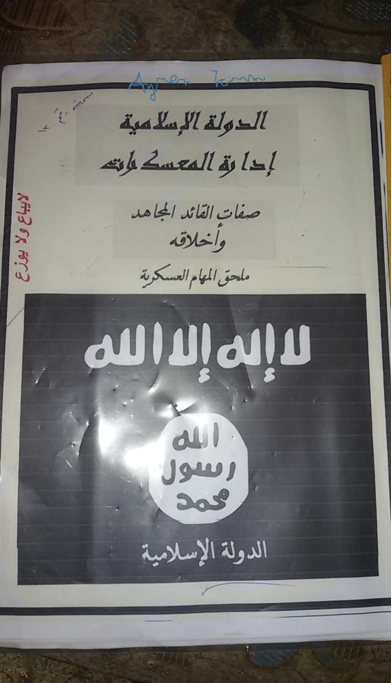
Islamic State
Camps Administration
Qualities and manners of the mujahid commander
Appendix on military missions
Not be sold or distributed
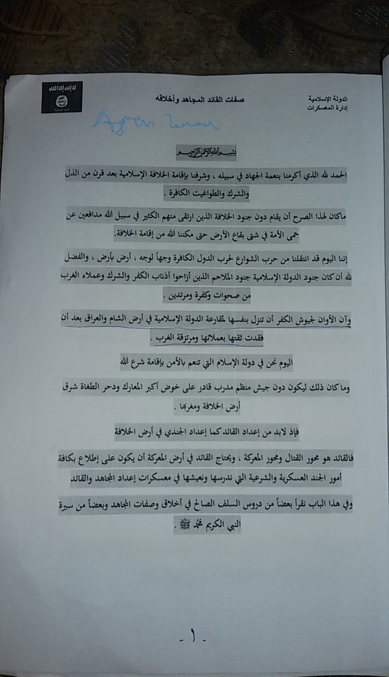
In the name of God, the Compassionate, the Merciful
Praise be to God who has ennobled us by the blessing of jihad in His path, and ennobled us with the establishment of the Islamic Caliphate after a century of humiliation, idolatry and disbelieving idolatrous tyrants.
It was not for this edifice that it should be established without the soldiers of the Caliphate, many of whom died in the path of God, defending the enclosure of the Ummah in every corner of the world until God enabled us to establish the Caliphate.
Indeed today we have moved from the war of the streets to the war of the disbelieving states, face to face, land against land. And by God’s grace the soldiers of the Islamic State have been the soldiers of the epic battles who have routed the followers of disbelief and idolatry as well as the agents of the West from Sahwa forces, disbelievers and apostates.
And the time has come for the armies of disbelief to come down themselves to fight the Islamic State in the land of al-Sham and Iraq, after their trust in their agents and the mercenary gangs of the West was lost.
Today we are in the Islamic State that is blessed with security by establishing the law of God.
And that was not to be without an organized, trained army capable of waging the greatest battles and destroying the tyrants in the east and west of the land of the Caliphate.
So one must prepare the commander just as there is the preparation of the soldier in the land of the Caliphate.
For the commander is the pivot of the fight and the pivot of the battle, and the commander in the land of the battle needs to be ready to set out with all the military and Shari’i matters of the soldiers that we study and live by in the mujahid and commander preparation camps.
And in this section we will read some of the lessons of the just predecessors on the manners and qualities of the mujahid and some of the Sira of the Noble Prophet Muhammad (SAWS).
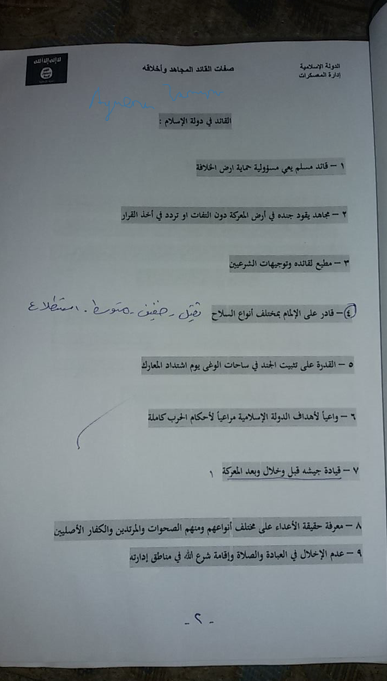
The commander in the Islamic State
1. A Muslim commander aware of the responsibility to protect the land of the Caliphate.
2. A mujahid leading his soldiers in the land of the battle without doubts or hesitancy in taking the decision.
3. Obedient to his commander and the directions of the Shari’i officials.
4. Capable of being familiar with various types of weapons [pencilled in: heavy, light, medium, reconnaissance].
5. Ability to make the soldiers firm in the fields of tumult on the day the battles intensify.
6. Being aware of the aims of the Islamic State and observing the rulings of war in their entirety.
7. Leadership of his army before, during and after the battle.
8. Knowing the truth about the enemies on their various types, and among them the Sahwa forces, the apostates and the original disbelievers.
9. No violation of worship, prayer, and establishing God’s law in the regions of his administration.
Introduction:
Jihad in the path of God is among the greatest of the hard responsibilities on the human soul. The Almighty has said, making easy its burden upon the mujahideen, on account of much good that derives from it exceeding its burden upon souls: “Fighting has been prescribed for you even though you dislike it, and it may be that you hate something and it is good for you, and it may be that you like something that is bad for you, and God knows and you don’t know”- al-Baqara 216 [Qur’an 2:216].
Therefore it is not possible for one to undertake it, except the one in whom God has cultivated qualities that make him suitable to undertake it, and the mujahid in the path of God- especially the jihad against the disbelievers and apostates by fighting them with life and wealth- is characterized by qualities by which the rest of the believers are characterized from what God has commended to the believers or commanded them to have. He also distinguishes them with the qualities that push towards one’s exertion with one’s life and wealth in the path of one’s Lord and seeking God’s contentment over all else.
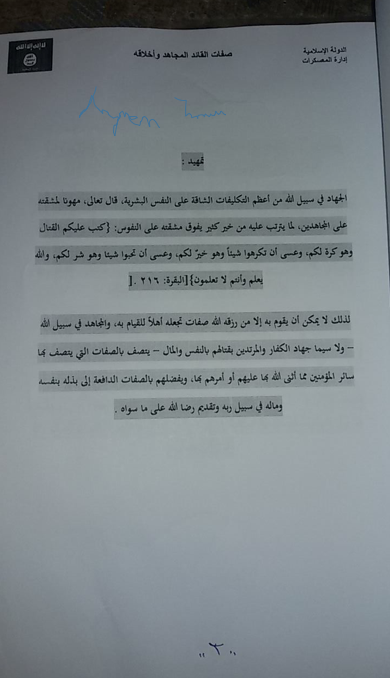
Qualities of the mujahideen:
Qualities with which the commander is adorned as they stand out more in him than others besides him- even if his army shares with him in those or in some of them and the qualities with which individuals of the Islamic army are adorned, and qualities with which the army as a collective is adorned.
And indeed the first basis- on which all manners are built that please God, and among them the qualities of the mujahideen in His path- is faith by whose force those qualities are strengthened and by whose weakness they are weakened equally in the leadership and army. Thus Ibn Taymiyya (may God have mercy on him) said: “And when there are the allies of God, and they are the pious believers, there is reckoning according to the faith and piety of man whose loyalty is to God Almighty. So the one who is most perfect in faith and piety, he is most perfect in loyalty to God, so people differ in quality of loyalty to God- Almighty and Exalted is He- and according to their difference thus do they differ in faith and piety.”
And the one whose faith is most perfect realizes his servitude to God most, so his time will wholly be in worship, learning, remembrance, piety, ihsan, pure devotion and pride in his religion, just as God Almighty has said: “And is the one who is obedient during the periods of night-time, prostrating and standing while being aware of the Hereafter and seeking the mercy of his Lord [equal to the one who neglects these things]? Say: Are those who know and those who do not know equals? Only those who have possessed understanding will remember. Say: Oh servants who believe, fear your Lord. To those who have done well in this world is goodness, and the earth of God is wide. Indeed, those who endure will be given their reward without account. Say: I have been commanded to worship God, purely devoted to Him in religion. And I have been commanded to be the first of the Muslims” [Qur’an 39:9-12].
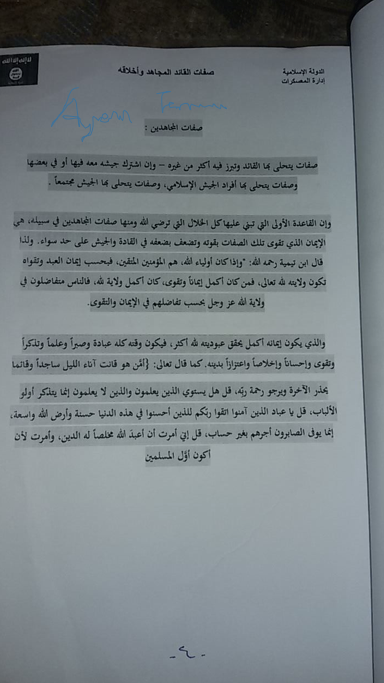
The commander in the soldiers of Caliphate [NB: this subheading is not in the original work by Ahdal]
The commander must excel the members of his army by being endowed with the components of successful leadership, so that he may be suitable to lead them, because he cannot lead them successfully in fulfilment of it unless he excels them in many of their qualities, and especially the quality of administration and direction. For followers generally, and the army in particular always aspire to lasting direction- as raising them in all they achieve is their aspiration- and to correcting the mistake that may suddenly arise from them, and to more knowledge, expertise, purification and other things besides that.
So if the leader does not have what gives him his soldiers, but rather he is like the rest of the individuals, or if there is among the members someone who is better than he, it becomes difficult for him to lead them with satisfaction from them as well as preference and affection for him, and he may be exposed to resentment, lack of obedience and plotting against him, as he comes to lack some of the leadership qualities. It is even difficult for the one informed about the Noble Qur’an, the pure Sunnah and the life of the just ancestors to become acquainted with the qualities of the leader, and it suffices that there should be something from them showing what must be above all else from the qualities.
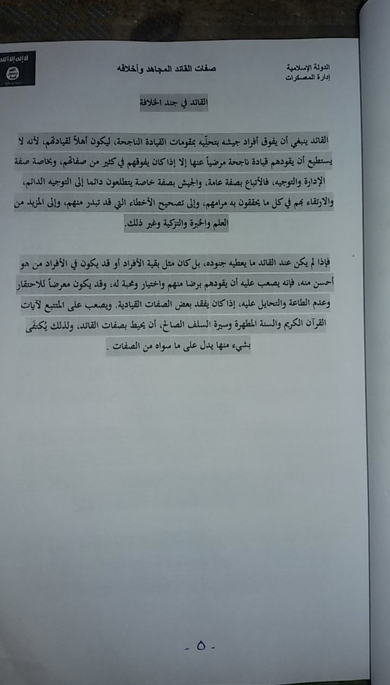
Striving to obey God
Indeed all the believers are in need of concern for themselves in obeying God to increase obedience to God, but the mujahideen in God’s path are in stronger need of this concern, and to prepare themselves to bear the burdens in God’s path. And the mujahid commander is not only in stronger need of this than all, but also rather necessity requires for him to continue in his concern for himself to increase obedience to his Lord and prepare it to bear responsibility and accept the burdens in His path with a welcome heart. For the field of responsibility of the commander is not like the field of responsibility of his followers, and the difficulties that face him are more numerous than the difficulties that face his soldiers, and what appoints him to take them head on and succeed against them is the force of his bond with his Lord who extends him help according to what he achieves from his worship of/[servitude to] Him (Thee do we worship and Thine aid do we seek- al-Fatiha 5 [Qur’an 1:5]).
Thus, God entrusted responsibility to His Prophet (SAWS)- when He sent him to call to Him- to increase closeness to Him and leave the bed and covering, that the necessary provisions for leadership of humanity and its struggle should increase. And by reading these verses in which al-qiyam is ordered- this order being justified by the heaviness of responsibility- and it is ordered to remember and devote time exclusively to God and entrust oneself to Him and be patient over harm to His people, this great command from which there is no escape for a commander becomes abundantly clear, and it is concern for the self in obeying God and preparing it to bear the burdens in His path.
The Almighty has said: “Oh you who wrap yourself in clothing, arise [to pray] in the night, except a little, or half of it, or subtract from it a little. Or add to it, and recite from the Qur’an. Indeed, We will cast a heavy word upon you. Verily, the measures of the night are stronger in concurrence and better for words. Verily, for you in the day is long toil. And remember the name of your Lord and devote yourself to Him. The Lord of the East and the West. There is no deity except Him, so take Him as guardian. And be patient over what they say, and avoid them graciously” (al-Muzammil 1-10 [Qur’an 73:1-10]).
One of the predecessors [Sayyid Qutb] said: “Indeed the one who lives for himself may live relaxed, but he lives small and dies small, but as for the big one who bears this great burden, what is there for him to do with sleep? What is there for him to do with the warm bed, and the calm life, and the relaxing sleep? Indeed the Prophet- SAWS- recognized the truth of the matter and its extent.
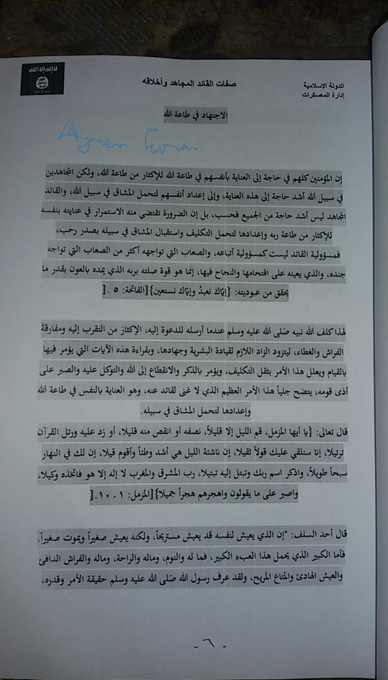
For he said to Khadija (may God be pleased with her) as she called him to rest and sleep: “The time of sleep has passed oh Khadija.” Certainly the time of sleep has passed and there has not returned since that day, but keeping awake at night, taking up the burden, and the long toilsome jihad (In the shadow of the Qur’an [29/3744]: “And I have tried to be guided to this hadith but I have not been guided to it”).
Thus SAWS responded, for he was undertaking his duties until his feet should break apart, just as he responded to his Lord in calling, patience and bearing the burdens until he met God. And his Companions- may God be pleased with them- imitated him, for they were keen to follow his footsteps- even if reaching the summit of obedience to him was far away- and his successors were most keen to follow him in concern for themselves in obeying their Lord and preparing them to bear the burdens in His path.
And everyone who has wished to lead the Islamic Ummah to the guidance of God, call to him and jihad in His path, must precede his followers in obedience to his Lord, and in preparing himself to bear the burdens of the call and jihad.
And it is not for a leader of one of the nations that his success should appear in leadership of his nation, unless he precedes his followers in all of the fields that are concerned among the necessities of the successful leader.
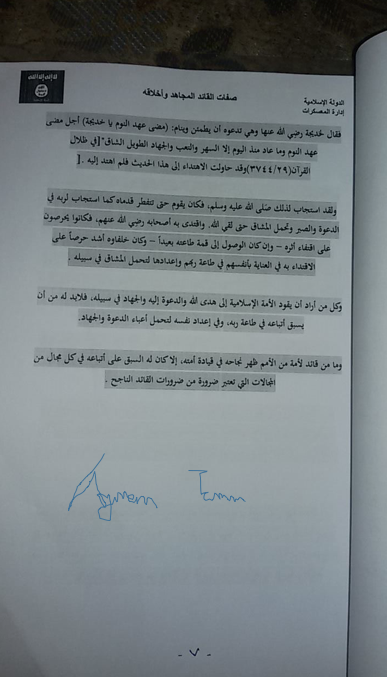
Trace of the good example in its time
Among the most important qualities of the successful commander in the Islamic State- may God protect it- [NB: ‘in the Islamic State- may God protect it’ is not in the original text by Ahdal] is that he be a good example to his army, in his faith, just operation, courage, generosity, pleasantness, mildness, determination, boldness, affection and the like, so that they may see what he calls them to or makes them embrace in his conduct, so that they follow the example of his deeds that attest to the truth of his words. And there has preceded what one can refer back to, and there may be added here an example not mentioned before, and that is that SAWS remained firm in the Uhud battle when his companions were wounded and fled, and he was as God described him, calling them from behind, as the Almighty has said: “When you climbed and did not look aside at anyone while the Messenger called you from behind, so God repaid you with woe after woe so that you would not be distressed at what you had lost or what had struck you, and God is well-aware of what you do”- Al Imran 153 [Qur’an 3:153].
And therefore it was from SAWS’ guidance that he should be in the frontline of the army in its going, and in the last line of the army on its return so that SAWS would be directly facing the enemy, and his companions, when the battle flared up, would be on guard with him. And in a hadith of Anas (may God be pleased with him): he said: “The Prophet (SAWS) was the best of people and the most courageous of people, and when the people of al-Madina were frightened one night so went out towards the voice, so the Prophet (SAWS) received them and had cleared up the news, and he was on Abu Talha’s horse without a saddle, and dangling down his neck was a sword and he was saying: “Do not be frightened. Do not be frightened.” Then he said: “We found it [running as fast] as the river.” Or he said: “It is perhaps a river.”
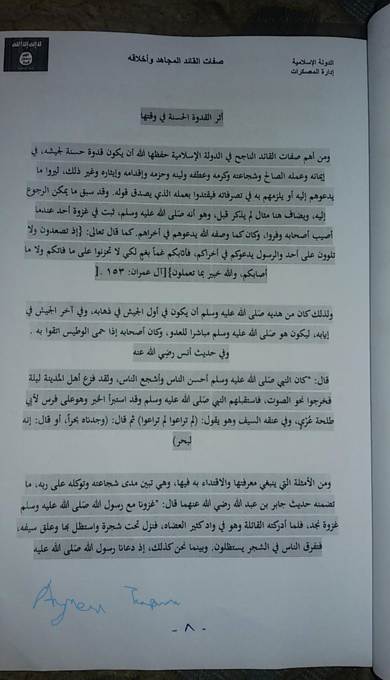
And from the examples that one must get to know and imitate him in those regards, they also make clear the extent of his courage and entrusting to his Lord, as included in the hadith of Jaber bin Abdullah- may God be pleased with them both- he said: “We launched the Najd expedition with the Messenger of God (SAWS), and when the siesta time came while he was in a valley with many thorny trees, he dismounted under a tree, sought the shade and hung up his sword, so the people dispersed in the trees seeking the shade, and while we were thus, the Messenger of God (SAWS) called us so we came, for there was a Bedouin sitting in front of him. So he said: “When this man came to me I was sleeping so he snatched my sword my stealth, but I woke up and he was standing over my head holding my sword without the sheath. He said: “What will save you from me?” I said: “God.” So he sheathed it and then sat down, so here this man is.” He added: and the Messenger of God (SAWS) did not punish him”- al-Bukhari.
And what this shows is that the Messenger (SAWS) called his Companions and informed them of what happened, so that they might take a real lesson of example on courage and entrusting to God. And from that is SAWS’ showing indifference to what afflicts him in the path of God when he said: “Are you but a finger that has bled, and what you obtained is in God’s cause”- al-Bukhari.
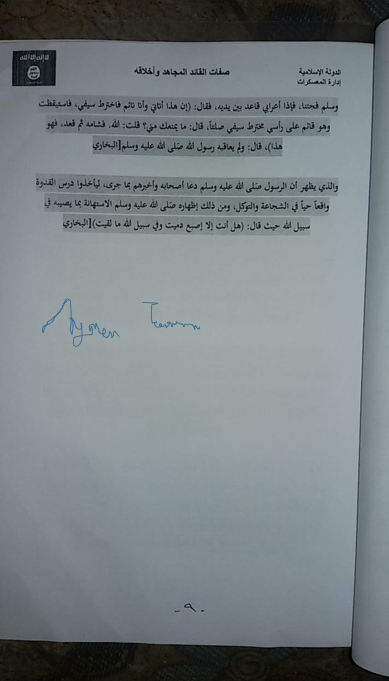
Purifying the soldiers and raising them in obedience to God
Indeed the Muslim commander must continue his education for his soldiers in matters of their religion, and nurture them with a nurturing that cleanses them of the filth of sins and vices, and he must connect them with the Book of their Lord [Qur’an] and the Sunna of their Prophet (SAWS), because the distance of the Islamic army from education, nurturing and cleansing may be a reason for the failure of their hearts and their committing acts of rebellion and sins, and that is among the things the commander must prevent between him and his soldiers. The Almighty has said: “God blessed the believers when he sent among them a messenger from among themselves, reciting to them His verses and purifying them, and teaching them the Book and wisdom, even though previously they had fallen into clear error”- Al Imran 164 [Qur’an 3:164]. And the Almighty has said: “He it is who has sent among the illiterate a Messenger from among themselves reciting to them His verses, purifying them, and teaching them the Book and wisdom even though previously they had fallen into clear error”- al-Jum’a [2] [Qur’an 62:2].
One of the predecessors [Sayyid Qutb] said: “And he purifies them, cleanses them, raises them and cleans them, cleansing their hearts, their conceptions and feelings, as well as cleansing their homes, honour and connections. He also cleanses their life, society an associations, and cleanses them of the filth of shirk, idolatry, superstition and legends, and what they transmit in life from decadent regulations, rituals, customs and traditions that are disgraceful to man and the meaning of his humanity. And he cleanses them from the filth of the ignorant life and what is polluted by it from feelings, rituals, traditions, values and understandings.”
The commander must undertake to nurture his soldiers and purify them by himself, and if he cannot undertake to purify all of his soldiers, he can undertake to nurture their leaders, each of whom can undertake the same process upon a group of them, because in the commander’s direct nurturing is that which raises the spirits in the souls of his soldiers, and strengthens their bond and loyalty to him on the basis of what pleases God the Exalted. Similarly it is the case that in that is unity of direction and correction of thoughts and understandings, and coming upon what may be among them from problems and attempting to resolve them and take interest in them.
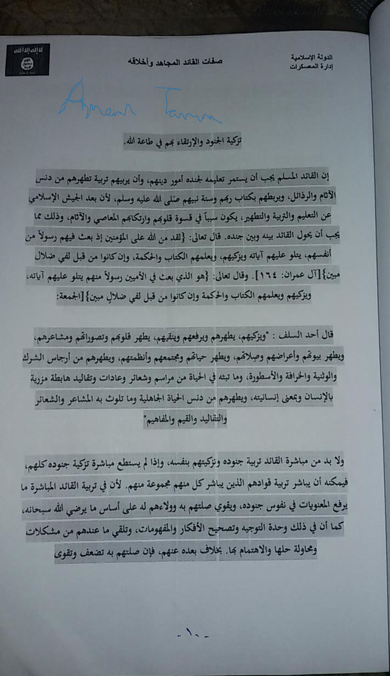
On the other hand, if he is distant from them, their bond with him becomes weak and their bond with others besides him becomes strong, such that the means of nurturing may differ, and likewise the ideas and understandings, and they may mention their problems to their direct leaders but they are not interested in them, and in that there may arise lack of confidence and doubt in the commander’s concern for their interests.
The commanders who are distant from the nurturing of their soldiers by themselves must bear the results of that distancing from the causing of division in their armies on account of the difference of means of nurturing, the multiplicity of direction, and the crowding of ideas in conflict with each other that make them split into many factions and groups, and the worst thing that has come upon the Islamic armies is bestowing their affairs to the enemies of Islam, from Jews, Christians, communists and idolaters, to undertake their training at arms and their training on thought programs that not one of them is exempt from receiving with his training on arms, for there is no distinction among the enemies of God between training on arms and training on thought programs, even if they differ a little or a lot. The Almighty has said: “Oh you who believe, do not take as intimates those besides yourselves who will not spare you from perdition: they wish that you have suffered and hatred has already appeared from their mouths, and what their breasts conceal is greater. We have already made clear to you the ayat if you use your minds”- Al Imran 118 [Qur’an 3:118].
And it does not suffice for the commander to begin the nurturing and then abandon his soldiers, but rather he must continue in nurturing and elevating his soldiers, as well as inciting their zeal to greater connection with God the Exalted, and this appears in many of the texts. And this is a hadith of Abu Huraira as an example: he said: the Messenger of God (SAWS) said: “Whoever believes in God and His Messenger, undertakes prayer, fasts in Ramadan, it is an obligation on God to enter him into Paradise, whether he has waged jihad in God’s path or sat in his land in which he was born.” So they said: “Oh Messenger of God, do we not tell the people? He said: “Indeed in Paradise are 100 degrees God has reckoned for the mujahideen in the path of God, and what is between two degrees is as between the heaven and the earth, so when you ask God, ask him for Firdous, for it is the most central and highest part of Paradise…”
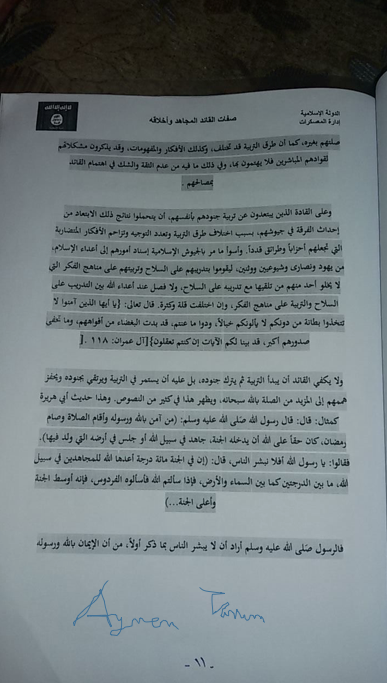
So the Messenger (SAWS) wanted that people should not be told of what he mentioned first, from the fact that faith in God and His Messenger, establishing prayer and fasting in Ramadan are things by which God enters people into Paradise, lest people should rely on just that: and the meaning is that they should increase just deeds, especially jihad in the path of God for whose people God has prepared what has been mentioned regarding the degrees.
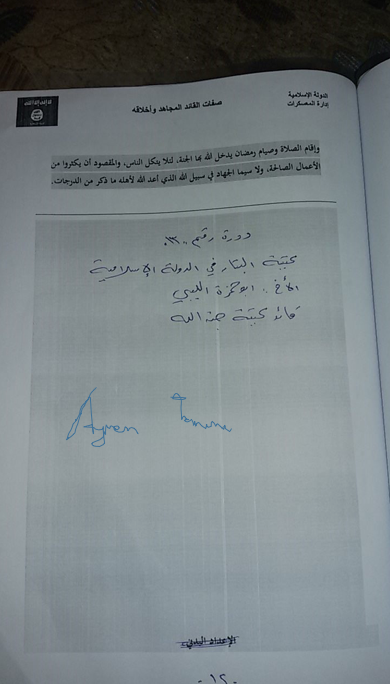
Bodily preparation
1. Preparation of the body means that you take up the causes of bodily health, and avoid every illness and risk that may temporarily or permanently influence the well-being of your physique and body, in fulfilment of the words of the Prophet in what Ibn Maja narrated on sound transmission: “There is no sin and there is no harm.”
2. Preparation of the body means that you avoid harmful things from apparatuses and drugs, and that you protect yourself against accidents and injuries.
3. Preparation of the body means that your body remains clean and noble beginning from your desire to follow the Sunan al-Fitra and ending with performing ablution and applying perfume.
4. Preparation of the body includes keen adherence to dietary program that is focused and specialised without excess or lack of moderation.
5. Preparation of the body includes conditioning it to harshness, hunger and harsh life through fasting and experiments of abstention from some of the coveted food items.
6. Preparation of the body means training every limb specifically by what builds in it the components of development and integration, so the valuation of the tongue, valuation of sight, tracking hearing and valuation of the bones and muscles and others besides them.
7. Preparation of the body means conditioning it and training it to be capable of bearing weapons, for weapons are heavy, heavy in their form, heavy in their respect and heavy in their value.
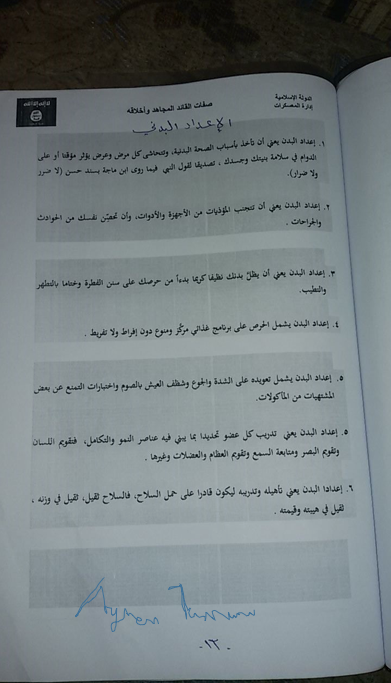
8. Preparing the body includes conditioning it to receive blows and resist injuries, and it is the Sunna of the struggle against the disbelievers: “If a wound should you, a wound like it has already touched the [opposing] people” [Qur’an 3:140].
9. Preparing the body includes training it in the arts of fighting, including fighting of the streets, wrestling and others besides them.
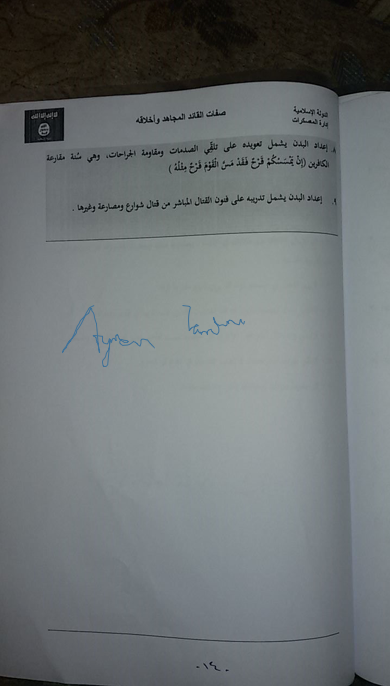
Advice for the commander among his soldiers:
1. The soldier of the Caliphate is a trust committed on your neck, his soul not being destroyed except you also are responsible for it whether it has been destroyed justly or in negligence on your part.
2. The cub scouts of the Caliphate are your students in jihad, learning from you and being guided in what they saw from their amir, so be the good example for them.
3. The mujahid won’t be interested in an assault without seeing his amir fighting in the struggle before him.
4. Rebellion should not appear on your part by which you might anger God and plant doubt in the heart of your soldiers.
5. Do not neglect your duties before God, for indeed in every act of rebellion is a cause for delay of victory or defeat for you and your soldiers.
6. Don’t despair in front of your soldiers for their zeal in defending or attacking will vanish.
7. Be embracing of your religion and missions: so your soldier may be like you.
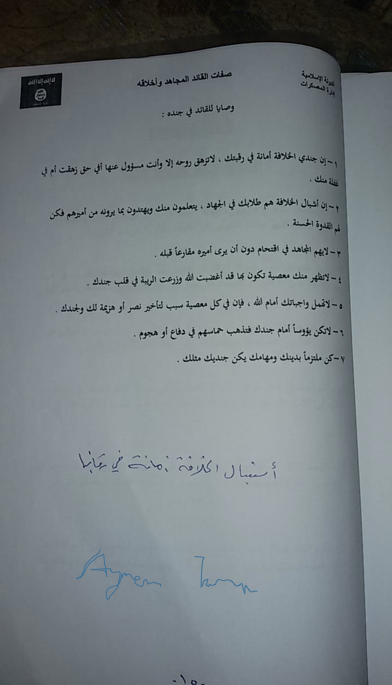
Appendix on military missions
Important notices in the arrangement of the wilayas:
1. Every graduate from a leadership preparation session must remain distant from the centre of the wilaya in which he is established for a period of six months and that is to practice in leadership and receive the necessary expertise skills.
2. One must deal with the security officials of the wilaya according to a text defined as an appendix for this book, and the private nature of the work of the security officials is to be respected [/observed], and there should be reservation over getting to know them on the part of the military administration for the wilaya.
3. The Diwan al-Hisba is bound by direct order to the military commander without resort to the wali [provincial governor] in special military matters as set out in detail in the security appendix.
4. All Islamic State facilities are to be set forth in the service of the military commander and that will take place following a letter to the military amir in the Islamic State. And the facility for each [/every] matter will be put in place according to the letter.
5. The military commander is not to conscript any new mujahid in the Jaysh al-Khilafa except after he has a letter with him from the camps administration requiring to subject the new mujahid to a Shari’i and military camp.
6. The commander during the battle is to send a signed letter from himself declaring agreement on a request for a martyrdom operation with an attachment in the name of the brother who will execute the operation and a photo of him, and all that will take place after the wali’s review of the letter.
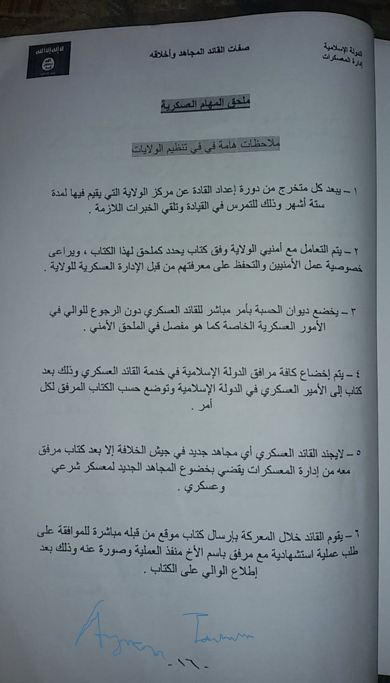
7. The military commander entrusted with the operation is to compile a document with the war equipment present before the battle and quantities of ammunition and supplementing it with another document after the operation making clear in it the quantity that has been expended and the war equipment that the mujahideen seized or lost during the battle and the matter is to be referred to the military amir through the Diwan al-Wilaya [provincial governor’s office].
- Connection is to be established with the media office for the wilaya through the wali’s office who should order for the media production of the operations or to spread the news of the battles according to demands of the military situation. This will take place in coordination with the security official for every wilaya.
9. Permits [of leave] for the mujahideen are to be done through the military commander for the wilaya only and in the event of lack of not being kept in order, the military commander is to refer a letter to the security official in which he explains the reasons and extent of the absence of the mujahid or his shortcoming.
10. In the event of disagreement between the military amir and the security amir in the wilaya, the disagreement is to be raised through the wali to the Diwan al-Khilafa [Caliph’s office] as soon as possible and the violators will be held to account in the event that the disagreement is raised to someone else besides them.
11. Every military commander is responsible for his combat missions only and in the event of necessity the wali defines for him- by letter- the missions assigned to him within the regions controlled by the Islamic State or outside them.
12. Every operation entrusted to the military commander is to be undertaken by assignment from the military amir for the Islamic State entrusted with administering the battles on the borders of the Islamic State, and it is not right for the military commander to enter any battle without direct order from the military amir.
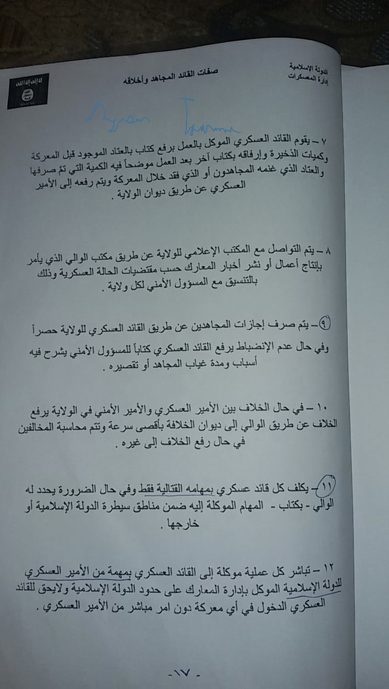
13. A military committee brought together by the military commander responsible for his area is entrusted with overseeing the dress of the mujahideen and their conduct, referring them to the Shari’i court in event of violation.
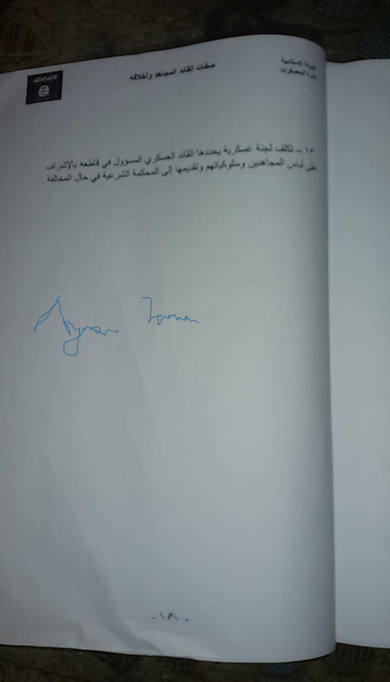
Finally:
The successful commander is the foundation of the Jaysh al-Khilafa, and upon you, mujahid brother, is the zeal of the Ummah and continuing its glory. By your jihad, you will support the Ummah or abandon it. Behind you is a complete army on your neck, behind you is a whole generation awaiting birth on the pure banner of tawheed in which shirk does not interfere.
Strive for your afterlife, for you are the crossroads of your Lord, and do not forget the leaders of jihad before you: our Sheikh Abu Omar al-Baghdadi- may God have mercy on him- and our amir Abu Bakr al-Baghdadi at whose hands God opened up the sites of the struggles of the world and the gates of the Caliphate- may God make it mighty.
So they are an example to you and future generations.
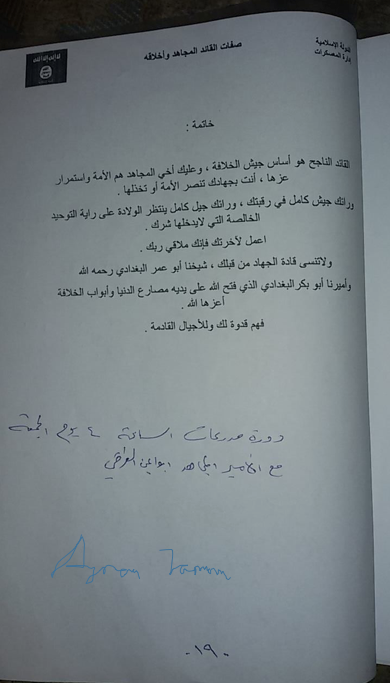

1 Reply to “The Archivist: Unseen Islamic State Military Commanders Manual: Qualities and Manners of the Mujahid Commander”
Comments are closed.